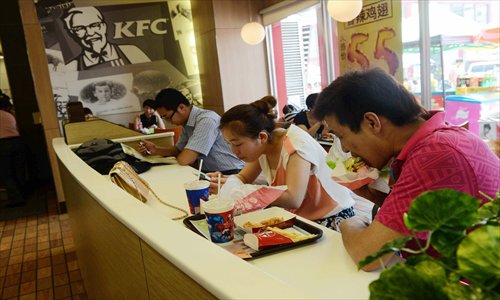Western fast-food firms contribute to China’s economy
KFC’s future is promising despite current boycott: analyst

Customers have meals at a KFC restaurant in Qingdao, East China's Shandong Province. File photo: IC
Residents in North China's Hebei Province reportedly dissuaded people from patronizing KFC over the weekend, but some domestic supplier of KFC said the prevalence for Western fast food in China contributes largely to the country's economy.
A businessman, who preferred to be unnamed, told the Global Times on Wednesday that his firm started providing potato chips to Western fast-food companies in China in 2013. His company is one of KFC's pilot suppliers in North China's Hebei Province.
"Every year, we produce 50,000 tons of potato chips for nearly 70 Western fast-food brands including KFC, McDonald's and Pizza Hut," the businessman noted. He said his company is expecting to produce 100,000 tons of potato chips in 2018, of which KFC's demand is likely to take up 10 percent.
"Thanks to our clients, we now employ over 400 employees and help more than 10,000 local potato farmers make a profit," he explained, noting that his company annually yields an average of 15 million yuan ($2.24 million) in taxes to the local government.
"Currently, we provide potato chips to only a few KFC stores across the country because we are in the second year of observation," the businessman said, noting that KFC has to test its suppliers' products for two years before signing official contracts.
Besides this supplier, Jiangsu Tyson Foods Co in East China's Jiangsu Province, Jiangxi Sunner Foods Co in East China's Jiangxi Province and Shanghai Hormel Foods Co in East China's Shanghai Municipality are all KFC suppliers, according to a sheet on the fast-food company's website.
KFC has around 550 Chinese suppliers who provide 90 percent of all materials for KFC stores in China, ranging from chicken, vegetables and bread to boxes, equipment and construction materials, said a statement on kfc.com.cn.
KFC in China aims to develop an industry chain of local suppliers, according to the statement.
KFC refused to comment when contacted by Global Times on Tuesday.
Western fast-food chains, like KFC and McDonald's, contribute to the country's economy in terms of employment and advanced business model and management, Ma Wenfeng, a senior analyst at Beijing Orient Agribusiness Consultant, told the Global Times on Wednesday.
KFC has opened 5,039 restaurants in China as of June 11 this year, according to its parent company Yum Brands Inc's second quarter report released on July 13.
In 1987, KFC China had less than 100 employees but the company has grown to more than 300,000 employees over the last 27 years of development, said the statement on kfc.com.cn, noting that its localization rate is 99.9 percent.
McDonald's has established more than 2,200 restaurants in China as of 2015, with over 100,000 employees since it entered China in 1990, according to McDonald's website.
The entry of Western fast food into the Chinese market also facilitates the development of the country's catering industry, as it increases competition between restaurants, Ma said.
McDonald's rolled out a self-made hamburger project in 2015, which allowed consumers to choose hamburgers with specific ingredients based on their own preferences. Following McDonald's lead, Chinese fast-food giant Kungfu announced in June plans to enable restaurants to let consumers order food to fit their individual tastes, the 21st Century Business Herald reported in June.
Optimistic outlook
KFC will continue to stay in China and its future is still promising, expert noted.
When the first KFC store opened in Beijing in 1987, only 8 menu items were available to choose from, now there are more than 60 dishes available for customers at KFC stores in China, said a statement on kfc.com.cn.
According to the statement, many of the items sold in KFC including the Old Beijing Chicken Wrap, Flaky Pastry and New Orleans Roasted Burger are targeting directly at the Chinese market.
A Beijing white-collar worker surnamed Chu told the Global Times that he loves KFC and McDonald's because eating fast food saves him a lot of time. "I also love traditional Chinese restaurants, but making delicate food costs time," he said.
"I'm optimistic about the future for Western fast food in China as they have existed nearly a hundred years in Western countries," noted the supplier of KFC.
Ma, the expert at Beijing Orient Agribusiness Consultant, said that KFC's reputation is unlikely to be tarnished by some Chinese boycotting.